Updated 31 August 2010
Originally posted 28 September 2008
Popiah (also spelled poh piah, poh pia, baobing (薄饼)), is an Asian dish popular in Malaysia and Singapore that’s like a fat spring roll, only not fried. Think of it as kind of an Asian burrito. Except that the popiah filling itself is much more complicated and contains so many more ingredients than a regular burrito.
Mum’s popiah are the best. It’s a perfect combination of sweetness from the flour sauce, the savoriness of pork and prawns, the spiciness of chili and garlic, and the crunch of cooling vegetables. It’s so yummy, you will gobble it down and hurriedly make another without even thinking about it. I have had popiah from hawker stalls in Singapore and Malaysia, even in Penang, where you will find the best food in the world. Mum’s popiah beats them all.
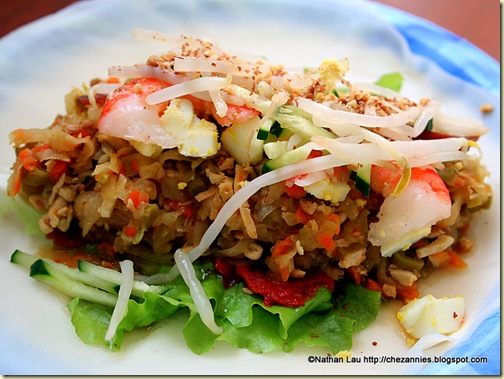
Happy Eating
As far as I can recall, whenever we had this dish I could always count on there being not just immediate family but extended family members joining us in partaking in the meal. In more recent times, this dish has become part of a family gathering celebration, such as Chinese New Year’s Eve or our occasional visits home from the US. Even now that we are back in Malaysia, Mom would make this dish when we fly back to KL from Kuching, which was then a good excuse to call upon all my cousins to join us in a meal.
Every occasion that we have been able to come back to KL to visit family has included the happy memory of wrapping and eating popiah together. So when Babe in the City sent out the call for her Merdeka Open House Roundup and announced the theme as “Food from our hearts” this was the dish that immediately popped into my mind.
Handmade Love
My mom has been making this dish for a really long time now. I remember as a child, I would be called upon to help when she made the popiah When I was young I would really resent when she would have a popiah party because it meant I would have to spend a good long time with a box grater shredding a mountain of jicama.
But as I got older I began to appreciate the love that went into making this dish. Or rather this project because even though it was one dish, the dish consisted of so many separate parts that had to come together that it really was a project. It would literally take a day to prepare.
My mom would take her time preparing this. Sometimes she would even start prepping the day before. Chiles and garlic would be blended, shrimp would be blanched and peeled, tofu would be cut and fried. Working methodically, she would prepare each and every ingredient, then stick it in the fridge.
The next day, a few hours before the party, she would take all the ingredients, fry each of them separately with garlic and sometimes brown bean sauce, and put it in a big stock pot one by one. Then she would simmer it to meld the ingredients together.
Mum’s Homemade Popiah Filling
As for the raw ingredients for the filling, these she painstakingly sliced, diced, julienned, and laid out on the table to be added to each one’s liking. Here we have julienned cucumber, blanched bean sprouts, and freshly made chili paste. Notice that the bean sprouts do not have that thin little "tail" that you normally see when you buy bean sprouts. Mum picked each tail off by hand. Again, her insistence on doing it by hand is to preserve the quality of the popiah.
Mum’s Homemade Popiah Fixins: Blanched Bean Sprouts, Julienned Cucumber, Chili Paste
On top of that, there are the seasonings or condiments to be made that add yet another level of flavor to this dish. These additional fixings include parboiled prawns that have been shelled, deveined and sliced in half, perfectly hard boiled eggs that have been diced by hand, sliced lup cheong (Chinese sweet sausage), and minced garlic.
Mum’s Homemade Popiah Fixins: Prawns, Hard Boiled Eggs, Chinese Sausage and Minced Garlic
The only modern conveniences Mum used was the food processor to make the chili paste, minced garlic, and chopped peanuts (not seen). She didn’t make the popiah wrappers herself. Those she bought from a local popiah skin maker in Petalilng Jaya. Either that, or frozen spring roll wrappers from the Asian grocery store when we were in California.
Spring Roll Wrappers for Mum’s Homemade Popiah
No Small Affair
It is no wonder for the amount of work that it took, that mom never made it a small affair. After all, the work was going to be the same so might as well make large portions and make it into a party.
I once did this in California on my own and discovered why most Asian families would choose to make popiah as a family activity. Making popiah is laborious, and should only be undertaken with love. Many hands working together do indeed make light work. And many hands coming together to share in the meal make for light hearts, good times, and great memories.
I include here my mom’s recipe for a party-sized gathering of popiah eaters. Do not attempt to do this for a small crowd.
Mum’s Popiah Recipe
Popiah cooked filling:
6 lbs jicama, shredded, either with a sharp knife or using a box grater (the large hole grater)
4 large carrots, shredded
1 lb small shrimp, peeled, cut in half and shells reserved for stock
1 1/2 lbs belly pork or pork picnic, parboiled to harden well enough to julienne fine
1 lb green beans, chopped
1 lb green cabbage, finely shredded (about one small head)
1 lb firm tofu (taukwa), julienned fine
2 heads of garlic, finely minced
4 Tbsp brown bean sauce (taucheong)
salt to taste
chicken bouillon to taste
Vegetable oil for stir-frying
Additional choice fillings:
2 chinese sausage (lup cheong), halved and sliced thin
1 cucumber, julienned (if very seedy, remove seeds then julienne)
4 eggs, boiled and chopped
1/2-1 lb large shrimp, boiled in shell, then peeled and halved, shell reserved for stock
1 lbs peanuts, roasted, cooled and ground fine
2 heads Green leaf lettuce, leaves individually picked and washed clean
1/2 lb beansprouts, tips picked off (if very diligent), and blanched
Condiments:
Minced garlic (whatever is not used up in the filling can be used here)
Chilli sauce (made by blending 10-15 large red chillies of moderate heat level or if you can tolerate spice, add spicier chillies)
Hoisin or sweet flour sauce
Popiah skin
Method:
For the cooked filling:
1. Heat a little oil (about 1 tsp) in your wok, and fry the taukwa until mostly dry. Remove and set aside.
2. Make sure to set aside the stock you have made from boiling the shrimp shells and the pork.
3. Heat the wok with a little bit more oil (about 1-2 tsps). Add 1 tsp minced garlic, and stirfy the shredded carrots briefly (1-2 minutes). Transfer carrots to a large stock pot.
4. Repeat #3 with the green beans, then the cabbage, then the jicama, frying each vegetable briefly and individually before adding to the large stock pot.
5. Add more oil and about three times more garlic (3 tsps), then add brown bean sauce and stirfry for about 1-2 minutes being careful not to burn it. Keep your fire on medium to low heat. When it starts to smell aromatic, add the julienned pork and stirfry until almost cooked. When the pork is almost done, add the shrimp. Cook until shrimp is just done. Transfer to the large stock pot with the vegetables.
6. Cook all the vegetables and meats in the pot for about 10 minutes over medium low heat, stirring to mix all the ingredients.
7. Add taukwa to the mix. Cook the mixture for about 30 minutes, adding about 1/2 cup of the reserved shrimp and pork stock. After cooking for 30 minutes, season with salt and chicken bouillon to taste. Don’t add seasonings till the mixture has had a chance to work its magic and impart its many flavors. That way, you won’t end up overseasoning in the beginning.
8. Once you have added your salt and chicken bouillon, simmer for 5 more minutes or until the flavors are all mixed well and the vegetables are tender.
For the choice fillings and condiments:
1. Place each ingredient into small serving bowls (and replenish as they run out).
Balance Building
Building the popiah takes skill and practice. All of the ingredients are tasty, but you don’t want to put too much or you will over-stuff the popiah and then it will explode all over your plate once you try to bite into it. Plus, the perfect popiah will have a balance of flavors.
Popiah Filled with Mum’s Popiah Fillings and Fixings
Watch this video I made of Mum building and wrapping her popiah:
Mum’s Homemade Popiah Rolled
As you can see in the picture, this popiah has burst open. Not because it was over-stuffed, but because the skin wasn’t freshly made. A freshly made popiah skin is thin, pliable, and stretchy. Unfortunately, you can’t find freshly made popiah skin in San Jose. If you want freshly made popiah skin, you’ll have to go to Malaysia or Singapore where the experts are.
Beautiful Bites
After you wrap your popiah, devour immediately. Savor the complex flavors as the filling saturates your taste buds. Embrace that first hit of jicama followed by slight brown bean / garlic flavors plus the richness that comes from the combination of root vegetables, meat, shrimp and tofu all rounded together to give it sweetness that is also savory. It is a beautiful sweetness because of the root vegetables having exuded the flavors into the mix.
Add to that the crunchy raw textures of the uncooked vegetables and ground peanuts then the eggs and the shrimp contrasting with the soft cooked ingredients. On top of that is the spicy kick from the chilies and the garlic and the sweet sauce.
Stuffed
Almost always, that first popiah would be too big because your eyes would be too big and you would want to stuff every ingredient in, but the wrapper is made of a thin crepe instead of a tough tortilla. On the second and the third you would get wiser and start to balance your ingredients so that it would fit nicely without overwhelming this pancake.
The best part about this dish is that one can eat one or two rolls, leave the table, have a little conversation in the living room while others take your place at the dining table, and then come back again for seconds and thirds. My limit is 4-5 popiahs. Mum’s popiahs are tasty enough to leave me craving for more, but my tummy just can’t handle that many at one sitting, no matter what my head says.
Mum’s popiahs are is home made, heart-made food and we were spoiled by it.
Cheers, Annie
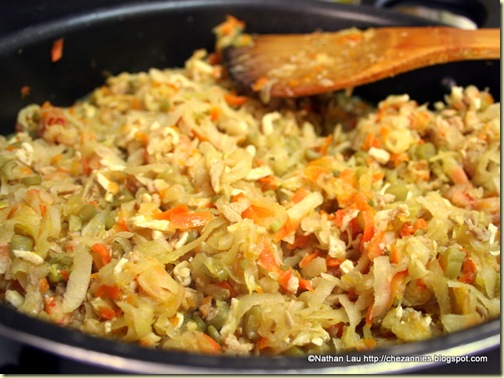
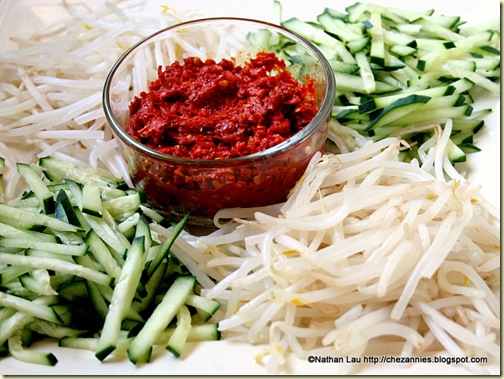
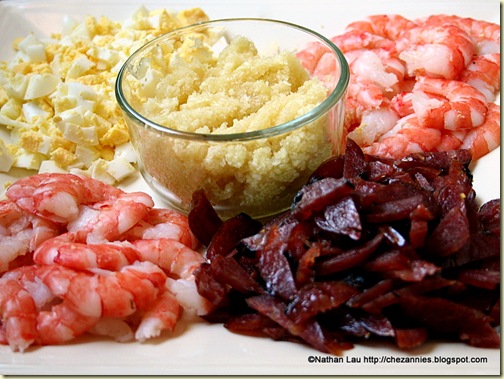
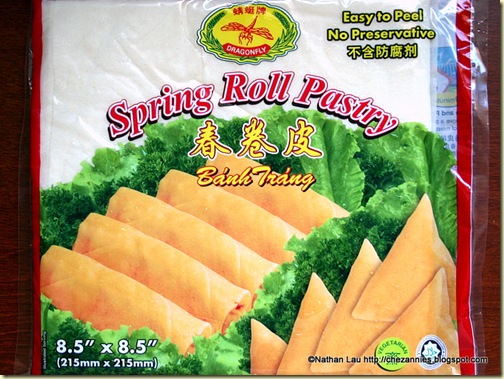
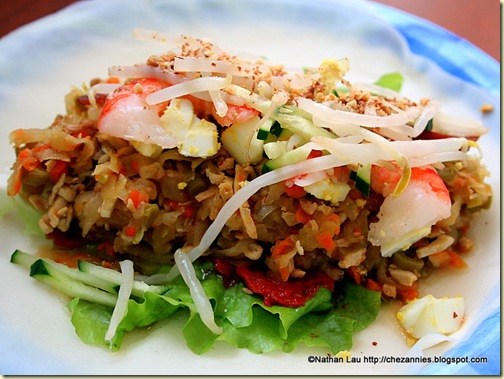
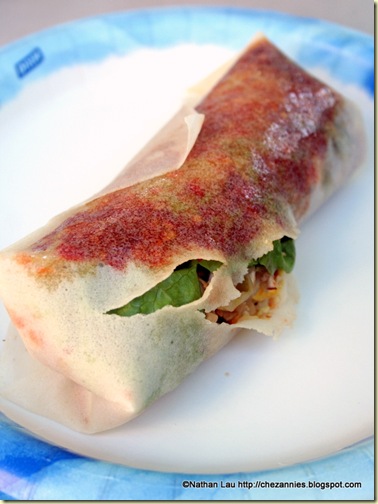
That looks sooo good. It’s almost like mu shu pork but burrito style. Did you end up pan-frying the popiah? The picture at the end looks like it was cooked a bit on one side. Do you think they make these at the Malaysian restaurants in San Francisco? Because there’s no way I can make this for myself since I’m the single guy. 😉
Ben –
No, this popiah wasn’t pan-fried. The coloring comes from the red chili paste smeared on the inside of the skin. But pan fried popia is certainly delicious!
I’m not sure if the Singaporean / Malaysian restaurants in SF make these. Guess you’ll just have to come over to our side of the world to enjoy them! Or wait until we get back to the Bay Area…
Nate
The Penang restaurant in West Covina in the Los Angeles area probably serves fresh poh piah. I have eaten Penang’s poh piah many times in New York City and found it to be so-so. Their skins are good but the filling is unfulfilling. Nothing like the homemade stuff. Still, when one is far from home, it’s better than nothing. BTW, if you are in Singapore, check out the poh piah skin store in Joo Chiat Road. You can see the pros at work there.
Becky – thanks for the helpful information! We’ll have to head out to Joo Chiat next time we’re in S’pore.
Hello Becky Choo, Could you please kindly provide the address and the contact number for the poh piah skin store at Joo Chiat Road
Oh Annie, your popiah looks so delicious, I know it is lunch time and I am torturing myself looking at the pictures of your rolls…
Juliana – as Becky said above, Penang Restaurant in West Covina sells popiah. Maybe you can go there and satisfy your cravings 🙂
Hi Annie, OMG I so miss popiah right now.
I have a question: why do you have to stir-fry those ingredients with garlic separately when they all end up cooked in the same pot?
Thanks for the popiah skin recipe and the popiah looks fantastic!
Oh yeah, Chinese lumpia (what we call our version of popiah) is so labor-intensive! And yes, all the veg prep needs to be done by hand: it tastes better that way. We usually don’t put the sweet flour sauce and chili paste, and toppings usually are egg “omelette” strips, deep-fried “seaweed” shreds combined with deep-fried (puffed) broken vermicelli (called “ho ti”), lettuce leaves, cilantro, minced garlic, and most importantly for me, peanut sugar! =)
TS – The deep fried seaweed shreds sound very interesting! No sweet flour sauce or chili paste? Is there something different that Filipinos use to dip their Chinese lumpia in?
Filipinos don’t actually eat this. They have “fresh lumpia” which is different. For this Chinese one, we just use “peanut sugar” — ground up peanuts mixed with sugar — for the sweet component. Not too sure if emphasis is placed on a spicy component; probably not.
Fantastic biteS!! I love it .. great coming by to see and to imagine the taste… 🙂
My BoiBoi loves popiah but I think I’ll just buy for him cos it’s really tedious work. I salute Annie’s mother for preparing this popiah feast!
Thanks for participating in Merdeka Open House 😉
Babe –
thanks so much for hosting! This year’s roundup is really great. So many beautiful recipes to try out.
Nate
Wow! My family all time favourite, looks like I got to try it out.
Alice – do let us know how you like it!
Seeing the lovely photos have set off an instant craving for popiah :p like you said, it’s a labor of love. I’ve never attempted this before … I just order from a popiah store if I am hosting DIY popiah party, and of course it’s nothing compared to your mum’s =)
Wiffy – so the popiah store will sell you all the ingredients unassembled, and then your party guests build their own popiah? Sounds very cool. Kinda like DIY yee sang heheheh
I totally agree with you that eating/wrapping popiah has become part of the family celebration. I’ve made these a few times at potluck lunches/ dinners and it’s always the first food to disappear. Yep, it’s finger lickin’ good! I normally use some plum sauce, add fresh coriander (cilantro) or fresh mint and crispy fried onions/shallots for that extra crunch. Thanks for posting this recipe. I’ll give your mum’s recipe a try.. Must be good. cheers!
IH – thanks for commenting!
I’m impressed that you made popiahs for potlucks – that must have been a lot of work!
Haven’t tried mint as a condiment before – good idea. I love fried shallots too 🙂
Do let us know if you try the recipe.
Nate
my husband would love this, yes this is lot of work.
i would make this for a party if it is the only one i will bring.
i’m pretty sure i could handle this……lol, thanks for the video.
been to singapore but we did not eat a lot, but i got crazy
with shaved ice stand with all the sweets,pandan waffle with
purple ice cream….
about the flour which you mentioned in the recipe for Pohpia skin, is it all purpose flour? Thanks so much for showing how it is made and I wish you could write a note for other chinese show and ask them to put a subtitle in english where majority of people would love to follow a recipe and give it a try . I am not chinese but I love chinese food very much .
Nancy
yes it is all purpose flour, with a little bit of tapioca starch.
Thank you for your lovely write up on popiah. It certainly is a labour of love. I am somewhat obsessed with since I first tried it at my grandmother’s house in Singapore and think I would choose it was my last meal if I had to. Jicama is hard to come by in Australia, but whenever I see it, I have to buy it! I make popiah for my family about 3-4 times a year. I use an adaption of your mother’s recipe. I also use my food processor to make it, and can usually do it in just under 3 hours! The first time I did it all by hand and it took me 5 hours 🙂 It is a very good recipe! Thank you.
Dear Nate,
This post has inspired me to make popiah for my next home party. It is definitely fairly labourious so might as well do it for a huge crowd. We can’t get the popiah skin in Sydney either. The video is awesome and your mum did a great job folding it. The choice of the guitar music is interesting!
ChopinandMysaucepan,
thanks for your comments! I’m sure you and your party will have lots of fun.
The instrumental is actually by ukulele virtuoso, Jake Shimabukuro off of one of his “Pure Heart” group albums.
Great info! What’s missing? Fried shallots! 🙂
Tried your recipe. It was absolute success (although we forgot about the pork stock). Everyone thought the filling was way better than my previous attempt. Thanks for sharing!
Ling
you’re welcome! Thanks for the comment. Glad your friends liked it.
Wow..thank you for sharing this..I will try preparing this..I can relate and can do one but with a wrapper and its fried..thanks again
Yum! I think about having a po piah party often but the thought of the labor that goes into it just weighs me down. Thanks for sharing. I need to gather enough courage to do all the preparations 🙂
Tiffany,
many hands make light work 😉
I has been always arranging this Poh Piah party for my oversea guest…..
Main ingredient using China can Bamboo shoots instead of Turnip…
I would prepare wasabi if there are Japanese guest, and mustard , Tabasco for Europe guest.
Also when using ingredients…Japanese with Tako slice, and Abalone slice….ham slice…
Chinese with sea Jelly fish slice….
Always demonstrate before the guest do it themselves…and use green leaf to base on the poh piah skin to prevent it from being wet by sweet sauce and broken when rolling.
That’s creative and laughing ….thank you.
Can i fry the fresh popiah skin with the abv fillings?
Hi, just wondering, when you say party-sized, roughly how many people do you mean?
If I’m good, how many wrappers can I make from a kg of flour and other ingredients?
Annie & Nate,
Thank you so much for your recipe. I googled & tried several before following yours.
I think your mom’s method of frying all the ingredients separately & using just a scant amount of stock which helps the shredded veggies steam in their own juices made all the difference! The popiah filling is sweet and flavoursome.
To address some fellow commenters, I made this recipe for a family of 3 by halving the recipe – and it’s still good for 2 meals.
about 15-20 popiah from the halved recipe.
I used Spring Home spring roll wrappers – bought from the asian mart’s freezer section. Just thawed it and it was good to use. Woo!
Spring Home wrappers